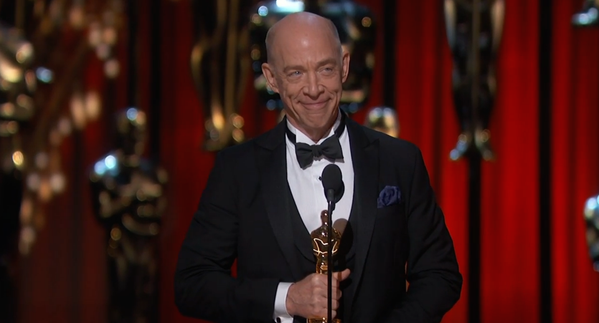JK Simmons a fost preferatul meu în categoria lui și o să vă placă și discuția din culise.
Q. With all of your long credits in stage, screen, television, T.V. commercials, what does this Oscar win mean to you?
A. Well, maybe more people saw me tonight than see me in the commercials for the first time, because I know those are seen by more people than the films. This is the, you know, the cherry on top of this extraordinary experience that WHIPLASH has been for me.
Q. I got the feeling that you wanted to talk a little more about when you said, “Call your mom. Call your dad.” It felt like you wanted to go somewhere with that.
A. I got out most of what I wanted to, and I was somewhat taken aback by the response from people that I don’t know, honestly. So, but no, I said most of what I wanted to say. I never go up there scripted, really. Most of it came out.
Q. Well, well deserved. For a lot of folks, this was kind of a representation of the classic, working actor really hitting it. What would you say to the working actor out there who is, like, I’m getting back on the bus?
A. You know what, I almost got back on the bus a handful of times. And if I had any really reasonable options in terms of employment, I probably would have, but unfortunately, I didn’t or fortunately, I guess, it seemed at the time. You know, I read a very romantic book when I was young, when I was in college, Rilke’s Letters to a Young Poet, and I’ve always felt that, you know, if you are in any kind of an artistic, creative endeavor and you feel that there’s something else you could do for a living and be happy, I think you should do something else because you are much more likely to find comfort and happiness. And if you can look deeply within yourself and honestly answer that there is nothing else that will bring you satisfaction, then there’s your answer.
Q. You know, this has been quite a triumphant time, and we always talk about, especially actors, how do you cope with the down times how, do you cope with the lean times. I’m always fascinated with how do you cope with success? How have these weeks added up, looking back? Thrilled? Scared? What?
A. Yeah, it’s definitely more tiring than the lean times. The lean times, you get plenty of sleep, and you are not flying around everywhere. So there is that. And for me, the lean times were a wonderful and beautiful part of my life, you know. I was, you know, struggling, quote/unquote, for many years doing regional theatre for not much money all over the country and doing odd jobs in between, but I didn’t have a wife and kids to support. So I had no responsibilities other than feeding myself and trying to be a decent human being and trying to get better at what I was wanting to do. And I look back on those times with great fondness.
Q. I want to ask you, why do you think this role just hit people the way it did with such great critical acclaim and what does the award mean to you? A simple question.
A. Well, I think the movie hit people because Damien Chazelle had a, you know, a life experience that he wanted to expound on and fictionalize. And he is a brilliant, brilliant creative artist. And he wrote characters that Miles Teller and I and Paul and Melissa and, you know, 42 actors were able to easily lift off the page that ‑‑ not easily, but clearly and simply lift off the page.
And what was the second part of your question?
Q. What does this mean to you after all these years?
A. It means more opportunities.
Q. Hey. Will you finally get on Twitter now?
A. No.
Q. So, I read that a lot of Academy voters particularly like this movie because they admire Fletcher. Do you think that’s a positive thing or is it humorous to you?
A. That’s a very loaded question. Thank you for that. I think there’s much to admire in Fletcher’s passion for art, for, in his case, specifically, jazz music. I don’t find much to admire in his pedagogy.

Leave a Reply